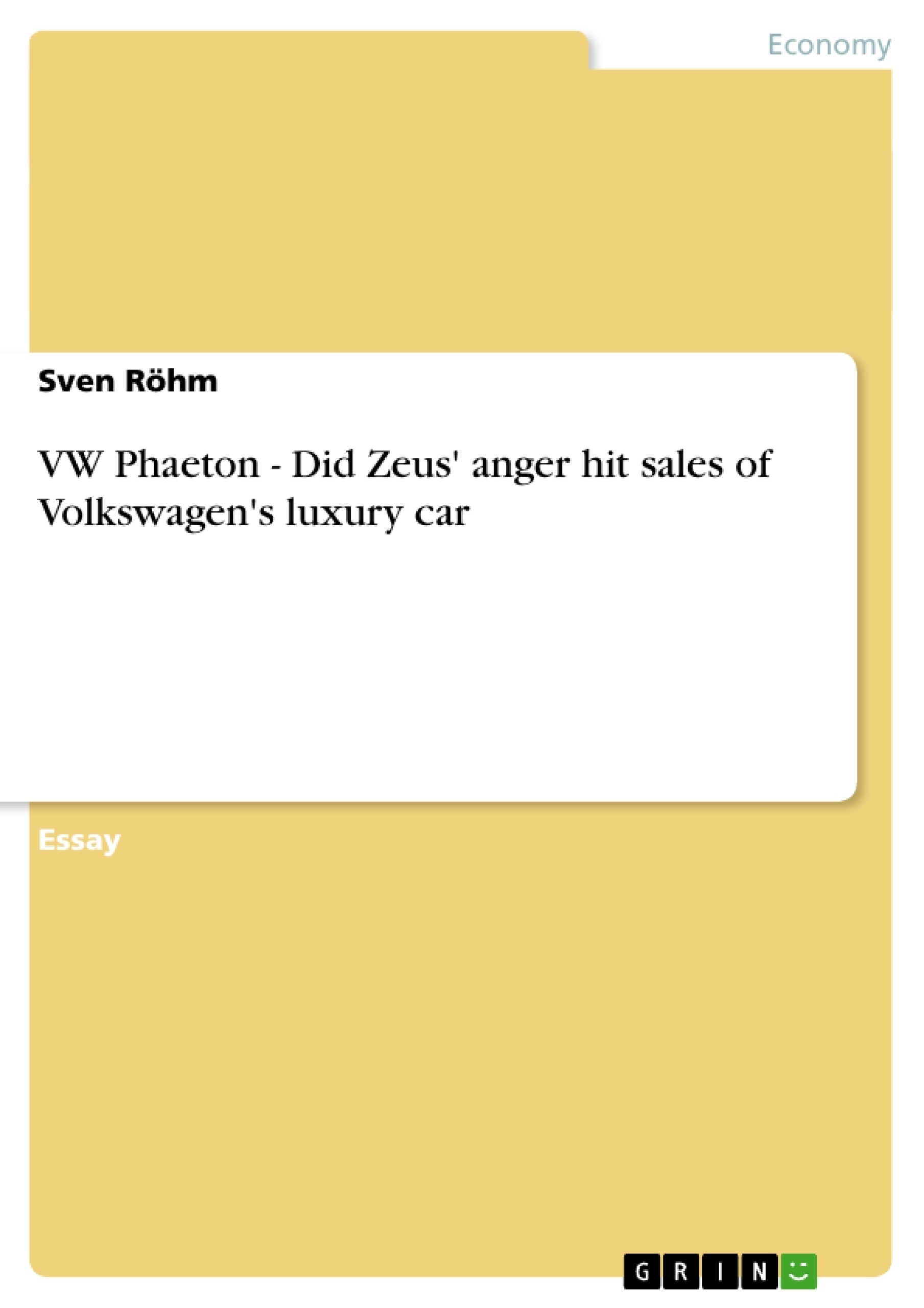After the introduction of the first Volkswagen luxury car in May 2002, sales are still far behind the Volkswagen’s expectation (Handelsblatt, 2003). It seems that the VW Phaeton faces the same destiny as its antique namesake Phaeton.
In the Greek mythology, Phaeton was the son of Helios, the sun god. Helios has driven the family chariot across the sky, wearing the rays of the sun as a crown, lighting the day. One day Phaeton convinced his father to lend him the beautiful chariot. But Phaeton, in contrast to his father, was not able to drive the chariot appropriately, and drove the chariot so close to the earth that he boiled the oceans and scorched the land. So Zeus had to stop him by killing him with a lightning bolt (Vaughn, 2003).
Volkswagen certainly had not considered this explanation when naming the Phaeton, but referred more likely to the second meaning of Phaeton; an elegant carriage of the 17th century which the owners drove on their own.
Nevertheless, there are signs that the Volkswagen engagement in the high-class (luxury) car market is tougher than expected. It seems people are less persuadable to buy a high-quality car of the experienced and renowned German car manufacturer.
This shows the divergence of the formerly targeted 12.000 to 15.000 units (Weernink, 2001) annually in global sales 2003 which is opposed by the actual numbers of only 2.600 units in Germany – the main market of the Phaeton – from January to October (Kraftfahrtbundesamt KBA) and estimated sales of 3500 units worldwide (Handelsblatt, 2003). The targeted sales of 20.000 units in 2004 (Weernink, 2003) seem to be completely unrealistic.
But the Volkswagen top-management remained silent. Although Volkswagen always claims that the Phaeton’s technology, specifications and passenger protection is absolutely comparable with the competing Mercedes S-Class, BMW 7 and Audi A8, customers seem to spot a big disadvantage of the VW Phaeton – the lack of perception and the missing customer benefit of expressing the driver’s status.
Inhaltsverzeichnis (Table of Contents)
- Introduction
- Customer wanted
- The luxury car market in Germany
- Volkswagen's current performance in Germany
- SWOT analyses applied to the VW Phaeton
- The PEST analysis
- Demographic environment
- Economic environment
- Natural environment
- Technological environment
- Political-legal environment
- Socio-cultural environment
- Strategic recommendations
Zielsetzung und Themenschwerpunkte (Objectives and Key Themes)
The assignment examines the performance of the Volkswagen Phaeton, a luxury car launched in 2002, and analyzes the challenges it faced in achieving its targeted sales figures. It delves into the competitive landscape of the German luxury car market, explores the customer perceptions and expectations surrounding the Phaeton, and examines the broader economic and societal factors influencing the product's reception.
- The Volkswagen Phaeton's performance in the luxury car market
- Customer perceptions and expectations of the Phaeton
- Competitive landscape in the German luxury car market
- Economic and societal factors influencing the Phaeton's success
- Strategies for improving the Phaeton's market position
Zusammenfassung der Kapitel (Chapter Summaries)
- Introduction: This chapter introduces the VW Phaeton and its historical context, highlighting the disparity between Volkswagen's initial sales projections and the actual performance of the vehicle. It delves into the challenges faced by the Phaeton in attracting buyers and the factors contributing to its underperformance.
- Customer wanted: This chapter explores the target market for the VW Phaeton and the factors influencing customer preferences in the luxury car segment. It discusses Volkswagen's strategy of targeting "non-conformist buyers" who value functionality and quality over brand prestige. The chapter also highlights the limitations of this approach, particularly in the context of the Phaeton's design and pricing.
- The luxury car market in Germany: This chapter examines the competitive landscape of the German luxury car market, focusing on the sales performance of major players like Mercedes, BMW, and Audi. It analyzes the impact of economic factors on customer purchasing decisions and the evolving dynamics within the market. The chapter also touches upon the strategies adopted by rival brands to maintain their market share in the face of economic challenges.
Schlüsselwörter (Keywords)
The assignment explores the dynamics of the luxury car market, focusing on the challenges faced by Volkswagen's Phaeton in achieving its sales targets. Key terms and concepts include customer perception, brand image, competitive landscape, market segmentation, customer expectations, economic factors, strategic marketing, and product positioning.
Frequently Asked Questions
Why did the Volkswagen Phaeton struggle to meet its sales targets?
The Phaeton faced a lack of brand perception in the luxury segment. Customers didn't see the benefit of using a Volkswagen to express their social status, despite its high-quality technology.
What is the mythological origin of the name 'Phaeton'?
In Greek mythology, Phaeton was the son of Helios who failed to drive the sun chariot and was killed by Zeus. Ironically, the car's sales also "crashed" compared to expectations.
Who were the main competitors of the VW Phaeton in Germany?
The Phaeton competed directly with established luxury models like the Mercedes S-Class, BMW 7 Series, and the Audi A8.
What was Volkswagen's target market strategy for this vehicle?
Volkswagen targeted "non-conformist" luxury buyers who prioritized functionality, quality, and technical specifications over the prestige of a traditional luxury brand badge.
What tools are used in the paper to analyze the Phaeton's failure?
The assignment applies SWOT and PEST analyses to examine the demographic, economic, technological, and socio-cultural environments surrounding the car's launch.
- Quote paper
- Sven Röhm (Author), 2003, VW Phaeton - Did Zeus' anger hit sales of Volkswagen's luxury car, Munich, GRIN Verlag, https://www.grin.com/document/24473



